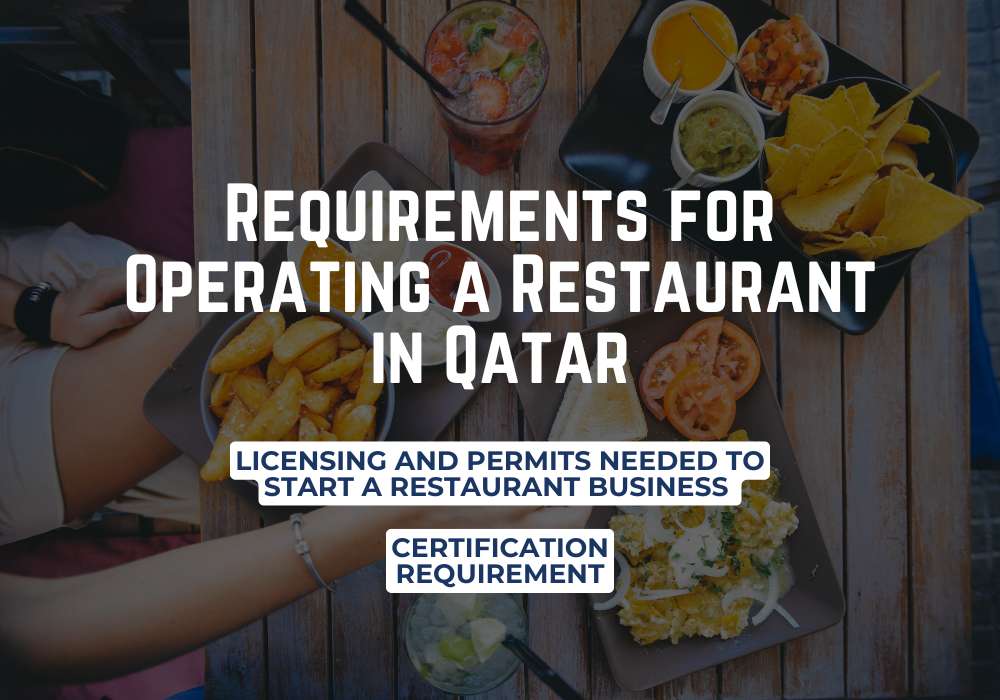Operating a restaurant in Qatar involves much more than just culinary skills and customer service. Restaurant regulations in Qatar are essential because they maintain high health and safety standards, promote fair business practices, and protect consumer rights. Important government bodies, such as the Ministry of Public Health and the Ministry of Commerce and Industry, keep an eye on the tight adherence to these requirements.
Health and hygiene standards are among the primary considerations in Qatar’s restaurant regulations. Establishments must comply with rigorous protocols to prevent health risks and ensure that food is prepared and served in sanitary conditions. Additionally, obtaining the necessary licenses and permits is a crucial step in starting a restaurant business in Qatar. This process involves meeting specific criteria and undergoing inspections to verify compliance with local laws.
Food safety is another critical aspect, with regulations covering everything from storage and handling to preparation and serving. These regulations aim to guarantee that all food products are safe to eat and to avoid foodborne illnesses. Mandatory employee certification and training ensures that all staff members understand safe food handling and hygiene procedures.
Understanding and adhering to restaurant regulations in Qatar not only helps new businesses launch successfully but also upholds the country’s reputation for high-quality dining experiences. By complying with these requirements, restaurant owners can create a safe, enjoyable environment for their customers and staff, ultimately contributing to the overall success and sustainability of their business.
Overview of Restaurant Regulations in Qatar
Introduction to the Importance of Restaurant Regulations in Qatar
Restaurant regulations in Qatar are vital for ensuring the health and safety of consumers, maintaining high standards of hygiene, and fostering a reputable dining industry. These regulations help protect the public from foodborne illnesses and ensure that diners enjoy a safe and pleasant experience. They also support restaurant owners by providing clear guidelines on how to operate their businesses compliantly and efficiently. Understanding and adhering to these rules is crucial for anyone looking to enter the restaurant industry in Qatar.
Key Government Bodies Overseeing Restaurant Regulations in Qatar
Several government bodies are responsible for overseeing and enforcing restaurant regulations in Qatar. Each of these entities plays a specific role in ensuring that restaurants operate within the legal framework and maintain the highest standards. The main regulatory bodies include:
- Ministry of Public Health (MoPH): The MoPH is responsible for setting and enforcing health and safety standards in all food-related establishments. They conduct regular inspections to ensure compliance with hygiene and food safety regulations.
- Qatar Tourism Authority (QTA): The QTA oversees the hospitality industry, including restaurants. They provide licenses and ensure that establishments meet tourism and operational standards.
- Ministry of Municipality and Environment (MME): The MME handles the issuance of municipal licenses required for restaurant operations. They also oversee the environmental aspects of restaurant waste management.
- Qatar General Electricity & Water Corporation (Kahramaa): Kahramaa ensures that restaurant facilities meet the required standards for electricity and water service connections.
- Ministry of Commerce and Industry (MOCI): The MOCI oversees business registrations and operational permits, ensuring that restaurants comply with commercial laws and regulations.
Understanding the roles of these key government bodies is essential for restaurant owners and operators in Qatar. By keeping abreast of the requirements set forth by these entities, restaurateurs can ensure that their establishments are compliant, avoiding fines and other penalties.
Setup Your Restaurant in Qatar! We Will Assist You From A-Z.

Key Regulatory Requirements for Operating a Restaurant in Qatar
Operating a restaurant in Qatar entails adhering to a variety of regulatory requirements. These requirements ensure that all restaurants maintain high standards of health, hygiene, and safety, providing a safe dining experience for customers. Below are the primary regulatory areas you need to focus on:
Health and Hygiene Standards Mandated by Qatari Authorities
Ensuring high levels of health and hygiene in your restaurant is crucial. The Qatari authorities have stringent standards that all food establishments must follow.
Here are the main aspects of health and hygiene standards:
- Cleanliness: Restaurants must maintain cleanliness in all areas including the kitchen, dining hall, and restrooms. This includes regular cleaning schedules and maintaining pest control measures.
- Food Handling: Proper food handling practices are mandatory. This means using clean utensils, appropriate storage, and avoiding cross-contamination between raw and cooked food.
- Personal Hygiene: Employees must adhere to strict personal hygiene standards, including regular hand washing, wearing clean uniforms, and using hair nets and gloves as required.
- Waste Management: Effective waste disposal systems must be in place. This includes segregating waste, using covered bins, and ensuring timely disposal.
Licensing and Permits Needed to Start a Restaurant Business in Qatar
Starting a restaurant in Qatar involves obtaining several licenses and permits. These legal documents are essential to operate legally within the country.
Below is a list of the primary licenses and permits needed:
- Commercial Registration (CR): This is the basic requirement to start any business in Qatar. The Commercial Registration certifies your business as a lawful entity.
- Municipal License: Also known as the Baladiya license, it is necessary for the operational premises of the restaurant. This license ensures that the location meets all municipal regulations.
- Food Establishment License: Issued by the Ministry of Public Health, this license certifies that your restaurant is authorized to prepare and serve food.
- Signage Permit: If you plan to put up signs or advertisements, you need to obtain this permit from local authorities.
Compliance with Food Safety Regulations in Qatar
Compliance with food safety regulations is paramount in maintaining the integrity and reputation of your restaurant. The regulations are designed to ensure that all food served to customers is safe and free from contamination.
Key elements of food safety regulations include:
- Food Storage: Must use the troper storage methods. This includes maintaining appropriate temperatures for perishable items and storing chemicals away from food.
- Temperature Control: Ensuring that food is cooked and stored at the right temperatures to prevent spoilage and bacterial growth.
- Monitoring and Documentation: It is necessary to properly document food safety procedures and conduct routine monitoring. This may include maintaining temperature logs, cleaning schedules, and inspection reports.
- Inspections: Restaurants are subject to regular inspections by health authorities to ensure compliance with food safety regulations. Ensuring that your restaurant consistently meets these standards is crucial.
Employee Training and Certification Requirements in Qatar
Employee training is an important aspect of maintaining a safe and compliant restaurant environment. The Qatari government mandates that restaurant employees undergo specific training and certification to ensure they are knowledgeable about food safety and hygiene practices.
Important training and certification requirements include:
- Food Safety Training: Employees must undergo training programs that cover the basics of food safety, sanitation, and proper handling procedures.
- Certification Courses: Various certification courses are available, such as the Food Safety Supervisor Certification, which aims to equip senior staff with in-depth knowledge of food safety regulations.
- Continuous Education: Regular refresher courses and continuous education are often required to keep employees updated on the latest health and safety standards.
- First Aid Training: Having staff trained in first aid can be beneficial to handle any emergencies that may arise within the restaurant.
Understanding and complying with Qatari restaurant regulations is crucial for those aiming to operate a successful and compliant dining establishment. The country’s government bodies enforce strict requirements for health, hygiene, and food safety to safeguard public health. Prospective restaurant owners must navigate a detailed process to obtain the necessary licensing and permits, and must commit to continuous compliance with regulations to maintain their operational status.
Food safety compliance serves as the cornerstone of restaurant operations in Qatar, mandating procedures that minimize risks and ensure high-quality culinary practices. This includes proper storage, preparation, and handling of food to prevent contamination and promote public health.
Furthermore, it is important that employees receive thorough training and certification. The efficiency and quality of services provided are improved overall when well-trained and certified staff follow regulations and best practices.
Setup Your Restaurant in Qatar! We Will Assist You From A-Z.






